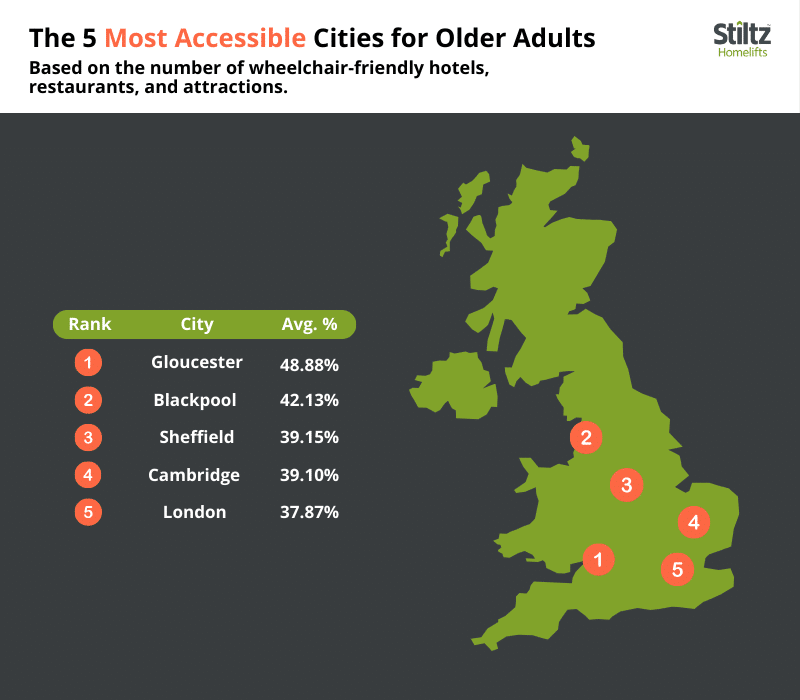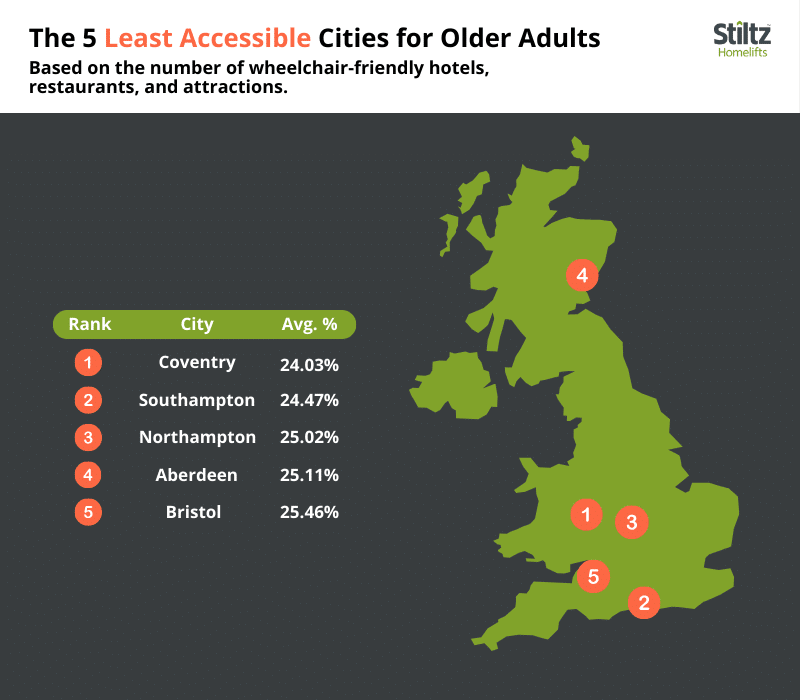We reveal which UK cities are leading the way in accessibility for older adults and why improving accessibility is essential for reducing loneliness and promoting independence.
Revealing the Most and Least Accessible UK Cities for Older Adults

For older adults, the ability to move freely around their community — whether it’s for errands, appointments, or simply socialising with friends — can have a big impact on independence, mental wellbeing, and overall quality of life.
Unfortunately, not all cities are designed with accessibility in mind. To find out more about which UK cities are leading the way and where there’s room for improvement, we analysed 25 of the largest cities based on their accessibility for older adults.
Revealed: How accessible are UK cities?
To determine how well the UK’s cities can accommodate older adults, we looked at the percentage of accessible options across three key amenities — hotels, restaurants, and attractions. We ranked 25 major cities based on the percentage of these locations that are wheelchair accessible.
Each location was then given an overall accessibility score, which was calculated from an average of the three separate percentages of accessible hotels, restaurants, and attractions.
The data highlights the differences between cities, showing which are leading the way in terms of inclusivity and where more needs to be done to help those of all ages enjoy their surroundings in the same way.
Methodology
All data is correct as of May 2025.
The number of hotels was collected on Booking.com through the filter of ‘hotels only’. Similarly, the number of accessible hotels was collected on Booking.com through the filters ‘hotels only’ and ‘wheelchair accessible’
The total number of restaurants was collected on Tripadvisor, alongside the number of accessible restaurants using the filter ‘wheelchair accessible’.
The number of attractions/tours was collected on Tripadvisor – Things to do. The number of accessible attractions/tours was also collected on Tripadvisor – Things to do, with the filter ‘wheelchair accessible’.
Why is accessibility important?
With the UK’s population ageing rapidly, the need for accessible spaces for older adults has never been more important. There are currently over 10 million people aged 65 or older in the UK, accounting for 19% of the population, and this figure is expected to reach 22.1 million (27%) by 2072.
At its core, accessibility is about reducing the physical barriers that make life more difficult for older adults, particularly those with mobility issues. Being unable to access social hubs in the local community can isolate older adults, with around 1.4 million people across the UK aged over 50 reporting that they regularly feel lonely.
Mike Lord, CEO at Stiltz, says, “Making cities truly accessible for older adults isn’t just about adding ramps and widening doorways — it’s also about creating and nurturing environments where people can connect with each other. Loneliness is a serious concern for many older adults, with 1 in 12 feeling isolated. When we improve accessibility, we open the door for them to interact with their community, whether it’s socialising at a local café or walking through the park to keep active, ultimately improving their mental and emotional wellbeing.”
The 5 most accessible cities for older adults
When it comes to making amenities easy to access for all mobility levels, some cities are much further ahead than others.

Here are the top five across the UK that are prioritising accessibility for older adults:
1. Gloucester – 48.88% average accessibility
Gloucester stands out as the most inclusive city, with an average accessibility rating of 48.88%. This includes an excellent 87.5% of hotels and 42.47% of restaurants being wheelchair-friendly. While some of the city’s most popular attractions are notably less suitable for those with limited mobility (16.67%), the accommodation and dining options make this city a great choice for older adults looking for a welcoming destination.
Mike adds, “It’s great to see Gloucester leading the way with so many accessible hotels and restaurants, showing a real commitment to making the city welcoming for everyone. Of course, there’s always room to improve, especially with attractions, but Gloucester’s focus on helping older adults enjoy more independence and comfort is something other cities can look up to.”
2. Blackpool – 42.13% average accessibility
Blackpool ranks second with an overall rating of 42.13%, including an impressive 75% of attractions being accessible, the highest in our research. While hotel accessibility lags significantly behind at just 14.34%, the number of wheelchair-friendly attractions, paired with 37.04% of restaurants, pushes this seaside city close to the top.
“Blackpool really stood out in our research, especially with its fantastic inclusive attractions, which make it a top choice for older adults. It’s also great to see plenty of dining options, giving people of all ages and mobility levels the chance to socialise. While we’d love to see more mobility-friendly hotels in the future, Blackpool is heading in the right direction,” says Mike.
3. Sheffield – 39.15% average accessibility
Sheffield ranked third in our research, with an average accessibility score of 39.15%. The city performs well across all categories, with 37.5% of hotels, 26.09% of restaurants, and 53.85% of attractions being mobility-friendly. This makes the city an excellent choice for older adults who want the freedom to explore and enjoy a variety of experiences during their stay.
Mike notes, “Sheffield impressed us with its wide variety of accessible attractions, hotels, and restaurants, giving older adults plenty of opportunities to get out and enjoy the city. It’s great to see, considering how these spaces can help people stay active while socialising with others in the community.”
4. Cambridge – 39.10% average accessibility
Cambridge comes in fourth with an impressive overall accessibility rating of 39.10%. The city saw 35.56% of hotels, 37.73% of restaurants, and 44% of attractions being wheelchair-accessible, with plenty of places to stay, eat, and explore. Because of this, Cambridge is a great destination for those with limited mobility looking to enjoy the city’s historic charm without any physical challenges.
“What we loved to see with Cambridge is its consistency across all venues. Whether it’s a cultural outing or sitting to enjoy a meal, it was reassuring to know the city is set up to support those with mobility challenges across the board. The high number of easy-to-navigate attractions especially helps older adults stay active, social, and engaged with all the city has to offer,” says Mike.
5. London – 37.87% average accessibility
London shows a strong commitment to accessibility with an average rating of 37.87%. The capital is home to many dining options and activities for older adults to get involved with, including 41.36% of attractions and 48.3% of restaurants being easy to navigate.
Mike adds, “London may not be perfect when it comes to accessibility, but it’s encouraging to see how much the city is doing to support those with mobility challenges. With great transport links, accessible restaurants, and more inclusive attractions popping up, London is giving older adults the chance to enjoy a vibrant social life without barriers.”
The 5 least accessible cities for older adults
While some cities are making great strides towards accessibility, others still have a long way to go. Unfortunately, there are cities in the UK where older adults may struggle with basic access to hotels, restaurants, and attractions, which can lead to feelings of frustration and isolation.

Let’s take a look at the five cities that still sadly fall short in terms of accessibility, highlighting the areas where improvements are needed most:
1. Coventry – 24.03% average accessibility
Unfortunately, Coventry ranks as the least accessible city in our research, with an average score of just 24.03%. Hotels and restaurants here are reasonably elderly-friendly, scoring 32% and 31.96%, respectively, but the city struggles when it comes to its attractions, with only 14.29% offering accessibility for those with limited mobility.
“It’s disappointing to see Coventry lag behind in making spaces easy to navigate for older adults, particularly with the city’s attractions. This limits the chances for older people to get involved in social and cultural activities, which are crucial for staying connected to others in the local community. More effort is definitely needed to improve accessibility in spaces like museums and galleries,” Mike notes.
2. Southampton – 24.47% average accessibility
Southampton also ranks low on the accessibility scale, with an average score of 24.47%. While restaurants fared slightly better at 34.28%, hotels and attractions remain less accessible for anyone with limited mobility, scoring 24.39% and 14.75%, respectively. This highlights an unfortunate gap in the city’s infrastructure that affects older adults who are eager to explore, socialise, and enjoy their surroundings.
Mike says, “Our research showed that Southampton still has some way to go in terms of accessibility. While restaurants are reasonably inclusive, the city struggles with making its attractions and hotels elderly-friendly. It’s so important for older adults to be able to explore all parts of the city — whether it’s a stroll along the waterfront or enjoying local events.”
3. Northampton – 25.02% average accessibility
Northampton ranks just slightly above Southampton with an average accessibility score of 25.02%. Its hotel accessibility stands at 20%, while restaurant accessibility reached a reasonable 34.6%. However, the city’s attractions fall short, with only 23.53% being easy to access. This highlights that, while dining out may be more manageable for all ages, there are still significant barriers to other key experiences that many older adults enjoy.
“Northampton’s low accessibility scores show how much work is still needed to support older adults. While there are some accessible restaurants, the lack of inclusive hotels and attractions limits what older visitors and residents can do. A more inclusive approach would make a huge difference, allowing older adults to remain active and social without restrictions,” says Mike.
4. Aberdeen – 25.11% average accessibility
Aberdeen offers a mix of accessibility across the city, with a 25.11% overall score. Hotels are fairly accessible at 27.91%, and restaurants do well at 33.33%. However, it’s clear there’s work to do in terms of making attractions easier to navigate, as only 14.1% are mobility-friendly. While you can find some areas of the city that cater to older adults, much more could be done to make key places more accessible for everyone.
“It’s great to see that Aberdeen is prioritising inclusive restaurants and hotels, but more needs to be done to improve the accessibility of the city’s attractions,” says Mike. “Having places to visit that are easy to navigate is vital for older adults who want to stay active and social. Improving these spaces would make Aberdeen an even more welcoming place for all.”
5. Bristol – 25.46% average accessibility
Concluding the five least-accessible cities is Bristol.
Bristol’s overall accessibility rating is 25.46%, with a few bright spots in hotels and restaurants. Around 32.76% of hotels are designed for easy access, and 23.26% of restaurants are mobility-friendly. However, attractions lag behind significantly at just 20.37%. While Bristol is a well-known, vibrant city, there’s room for improvement when offering inclusive experiences for older adults.
Mike adds, “Bristol’s accessibility in restaurants and hotels is a positive, but when it comes to attractions, there’s more to be done. Accessible attractions can help older adults enjoy their city and feel included in everything their community has to offer. Making these spaces more suitable for all levels of mobility would greatly benefit everyone who visits the city.”
The UK’s Most Accessible Cities
| Rank | City | Number of Hotels | Number of Accessible Hotels | % Accessible Hotels | Number of Restaurants | Number of Accessible Restaurants | % Accessible Restaurants | Number of Attractions/Tours | Number of Accessible Attractions/Tours | % Accessible Attractions | Average Accessibility % |
|---|---|---|---|---|---|---|---|---|---|---|---|
| 1 | Gloucester | 16 | 14 | 87.50 | 73 | 31 | 42.47 | 12 | 2 | 16.67 | 48.88% |
| 2 | Blackpool | 251 | 36 | 14.34 | 513 | 190 | 37.04 | 24 | 18 | 75.00 | 42.13% |
| 3 | Sheffield | 40 | 15 | 37.50 | 1472 | 384 | 26.09 | 13 | 7 | 53.85 | 39.15% |
| 4 | Cambridge | 45 | 16 | 35.56 | 432 | 163 | 37.73 | 100 | 44 | 44.00 | 39.10% |
| 5 | London | 1219 | 292 | 23.95 | 10000 | 4830 | 48.30 | 3844 | 1590 | 41.36 | 37.87% |
| 6 | York | 70 | 24 | 34.29 | 685 | 242 | 35.33 | 136 | 52 | 38.24 | 35.95% |
| 7 | Portsmouth | 40 | 10 | 25.00 | 137 | 57 | 41.61 | 15 | 6 | 40.00 | 35.54% |
| 8 | Belfast | 51 | 29 | 56.86 | 925 | 299 | 32.32 | 525 | 75 | 14.29 | 34.49% |
| 9 | Newcastle | 62 | 25 | 40.32 | 1042 | 301 | 28.89 | 54 | 17 | 31.48 | 33.56% |
| 10 | Oxford | 52 | 11 | 21.15 | 490 | 158 | 32.24 | 274 | 126 | 45.99 | 33.13% |
| 11 | Leeds | 54 | 24 | 44.44 | 1659 | 452 | 27.25 | 30 | 8 | 26.67 | 32.79% |
| 12 | Manchester | 135 | 52 | 38.52 | 2471 | 561 | 22.70 | 142 | 47 | 33.10 | 31.44% |
| 13 | Liverpool | 127 | 35 | 27.56 | 1787 | 455 | 25.46 | 223 | 90 | 40.36 | 31.13% |
| 14 | Cardiff | 49 | 16 | 32.65 | 875 | 280 | 32.00 | 117 | 31 | 26.50 | 30.38% |
| 15 | Bath | 39 | 9 | 23.08 | 438 | 134 | 30.59 | 247 | 76 | 30.77 | 28.81% |
| 16 | Birmingham | 79 | 26 | 32.91 | 2075 | 504 | 24.29 | 78 | 23 | 29.49 | 28.23% |
| 17 | Edinburgh | 184 | 56 | 30.43 | 1881 | 569 | 30.25 | 1085 | 227 | 20.92 | 27.20% |
| 18 | Swansea | 16 | 6 | 37.50 | 527 | 151 | 28.65 | 17 | 2 | 11.76 | 26.64% |
| 19 | Glasgow | 85 | 33 | 38.82 | 2331 | 577 | 24.75 | 382 | 58 | 15.18 | 26.25% |
| 20 | Brighton | 57 | 10 | 17.54 | 907 | 227 | 25.03 | 94 | 32 | 34.04 | 25.54% |
| 21 | Bristol | 58 | 19 | 32.76 | 1453 | 338 | 23.26 | 108 | 22 | 20.37 | 25.46% |
| 22 | Aberdeen | 43 | 12 | 27.91 | 534 | 178 | 33.33 | 78 | 11 | 14.10 | 25.11% |
| 23 | Northampton | 20 | 4 | 20.00 | 498 | 157 | 31.53 | 17 | 4 | 23.53 | 25.11% |
| 24 | Southampton | 41 | 10 | 24.39 | 601 | 206 | 34.28 | 244 | 36 | 14.75 | 24.47% |
| 25 | Coventry | 34 | 11 | 32.35 | 613 | 156 | 25.45 | 7 | 1 | 14.29 | 24.03% |
Boost your home’s accessibility with Stiltz
While general accessibility is essential to your everyday life, there’s no place like home when it comes to feeling truly comfortable and independent. If you’ve noticed your mobility is becoming more of a challenge, a home lift can be a fantastic way to continue enjoying your living spaces.
Browse our range of Stiltz home lifts, including the Duo and Trio models, to find the perfect fit for your needs. With a home lift, you can experience greater independence, comfort, and peace of mind.
Contact us today to learn more, or take a look at our blog for more inspiration and advice on staying in the home you love as you age.
Customer Testimonials
My experience with Stiltz Homelifts. Just over a month ago, I had my Stiltz lift installed and I am so pleased with it. The workmen that came and fitted it were very professional and knew what they were doing. They were so professional I would not hesitate to recommend Stiltz lifts to anybody.
Excellent from beginning to end – and beyond.
Everybody we dealt with at Stiltz was very helpful and efficient, from the initial meeting with Nick Sale, the sales rep, thorough technical inspection, the builders, installers, plumber, electrician, and excellent follow up service and attention. My husband’s life is transformed and mine is much easier. Thank you Stiltz.
An excellent company from the first contact to the completed project. All personnel were friendly and very polite but stayed extremely professional throughout. Having been in the construction industry for over 40 years I was aware the preparation work was carried out to a high standard by the best of trades people. The lift itself can not be faulted both the operation and aesthetics.
The service was better than 1st class. It was excellent in every way. We could not be more pleased with everything Stiltz applied it’s self to in any way. We would award 6 stars at the very least.
Suggested Articles
Five Reasons Why Home Lifts Are Better Than Stairlifts
Home lifts are a modern alternative to stairlifts, offering reliability, speed, capacity, and seamless aesthetic integration for a stylish and efficient solution.
What Happens If There Is A Power Cut And I Am In The Home Lift?
Power cuts can be unpredictable. Here’s what you need to know about using your home lift when the lights go out.
Accessible Living: Adaptations to Make Your Home Wheelchair-Friendly
Transform your home into a wheelchair-accessible space with our list of wheelchair-friendly adaptations.






